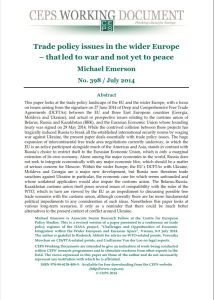Join getAbstract to access the summary!

Join getAbstract to access the summary!
Michael Emerson
Trade Policy Issues in the Wider Europe – That Led to War and Not Yet to Peace
CEPS, 2014
What's inside?
Trade policies in greater Europe resemble a complex labyrinth of potentially dangerous liaisons.
Recommendation
Trade alliances in the European region and around the world are a complex latticework of often-conflicting relationships. As wider Europe and the Eurasian region attempt to foster collaborative trade arrangements, Russia has opted out, choosing isolation over inclusion, conflict over comity. Political economy expert Michael Emerson of the Centre for European Policy Studies offers a succinct but rich analysis of free trade’s proliferation and its economic and political implications, particularly as they relate to Ukraine. getAbstract recommends his report to global business executives, policy makers and students of international commerce.
Summary
About the Author
Michael Emerson is an associate senior research fellow at the Center for European Policy Studies.





















Comment on this summary